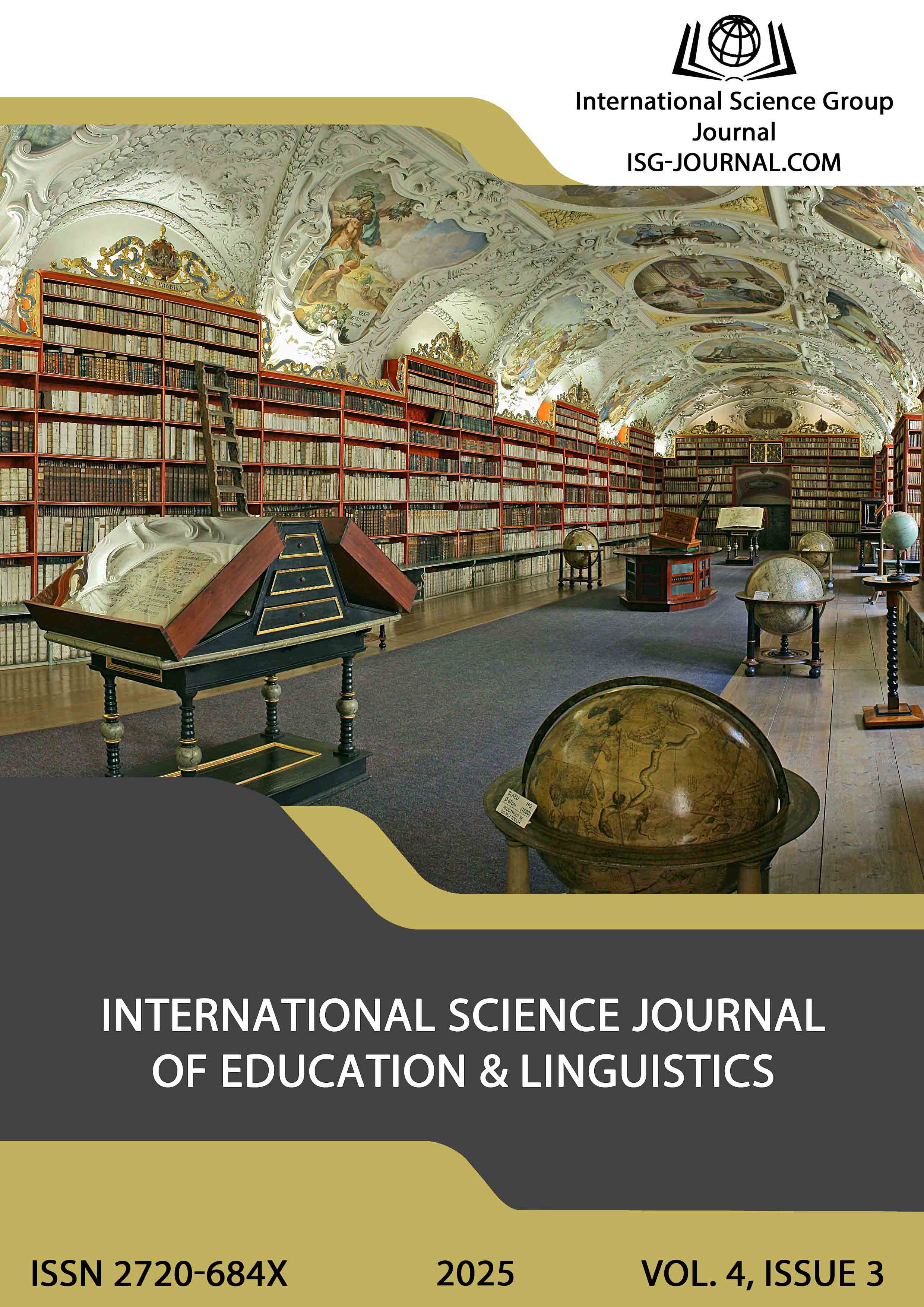Theoretical framework for drama translation
DOI:
https://doi.org/10.46299/j.isjel.20250403.09Keywords:
genre theories of translation, literary translation, drama translation, theatrе translation, approaches to drama translation, performativity, readabilityAbstract
The article summarizes the experience of foreign Translation Studies in the context of the genre theory of drama translation. The work is relevant, as the outlined research field is attracting more and more attention from different points of view, and various methodological approaches indicate the increasing role of the translator as a cultural translator. The object of the study is the process of reproduction of dramatic works within the intercultural communication framework, and the subject is the drama translation regularities and the factors that influence the process and determine its results. Drama translation has recently emerged as an independent field of translation studies and has a scientific basis, incorporating theoretical foundations and practical methods of Theater Studies, Literature Studies, Linguistics, and Translation Studies. Difficulties in understanding this process in Translation Studies are related to the dualistic nature of dramatic works, as they are both poetic and literary formations that belong to the theater activity. In the process of formation of Translation Studies as a scientific field (since 1972), this problem is realized in the confrontation among researchers about the essence of drama translation in the context of the concepts of “performativity” and “readability”. The article analyzes the influence of linguistic, semiotic, cultural and stage approaches on the understanding of the peculiarities of drama translation. The modern state of Translation Studies shows that the literary translation theory has clearly distinguished between the concepts of “translation for the stage,” “drama translation,” and “theatre translation,” which were used synonymously in the 1970-1980s of the XX century. The concept of drama translation is used to refer to translated works for both literary and theatrical systems. Theatre translation is defined as a stage-oriented type of translation or stage version. Translation for the theater is a special translation type that requires linguistic and stage knowledge, as well as an understanding of the environment in which the text will be performed.References
Галас А.С. Соціокультурна модель критики театрального перекладу: дис. … канд. філол. наук: 10.02.16. Львів: Львівський національний університет імені Івана Франка, 2023. 262 с.
Некряч Т. Муки і радощі перекладу драми.
http://www.t-fishing.co.ua/events/articles/muky-i-radoshchi-perekladu-dramy/
Фарина У.О. Особливості перекладу драм Юджина О’Ніла на українську, російську та польську мови: порівняльно-літературнознавчий аспект: дис. … канд. філол. наук: 10.01.05. Тернопіль: Тернопільський національний педагогічний університет, 2011. 243с.
Van den Broeck R. Translation for the Theatre. In Honour of Patrick Nigel Chaffey on the Occasion of his 50th Birthday,22 September 1998 with Contributions from Friends and Colleagues edited by J. T. Ydstie. Oslo: Centre for Applied Linguistics, University of Oslo, 1998.
Schultze B. Highways, Byways, and Blind Alleys in Translating Drama: Historical and Systematic Aspects of a Cultural Technique. Translating literatures, translating cultures. New vistas and approaches in Literary Studies. Ed.by K.Mueller-Vollmer and Michael Irmscher. Berlin, 1998. P. 177–196.
Nikolarea Е. Performability versus Readability: A Historical Overview of Theoretical Polarization in Theatre Translation. Translation Journal. 2002. Volume 6. No. 4. https://translationjournal.net/journal/22theater.htm
Bassnett S. Ways through the Labyrinth: Strategies and Methods for Translating Theatre Texts. The Manipulation of Literature. Lоndon: Croom Helm; NewYork: St.Martin’s, 1985. P. 87 – 102.
Bassnett S. Translating for Theatre: The Case against Performability. TTR: Traduction, terminologie, redaction. 1991. Volume 4. No.1. P. 99 – 111.
Pavis P. Problems of Translation for Stage: Intercultural and Post-Modern Theatre. The Play Out of Context: Translating Plays from Culture to Culture edited by H.Scolnikov and P.Holland. Cambridge: Cambridge University. Press, 1989. P. 25 – 44.
Randaccio M. Drama Translation: Theory and Practice. The case of Conor McPherson’s This Lime Tree Bower, The Weir, and St. Nicholas on the Italian Stage. Trieste: Edizioni Università di Trieste, 2022. 137 p.
Morrini M. Theatre Translation: Theory and Practice. London: Bloomsbury Academic, 2022. 166 p.
Kowzan T. From Written Text to Performance – From Performance to Written Text. Das Drama und seine Inszenierung. edited by Fisher-Lichte, Erika et al. Tübingen: Max Niemeyer Verlag, 1985. P.1–11.
Venuti L. The Translator’s Invisibility: The History of Translation Studies. London: Routledge, 1995. 368 p.
Fischer-Lichte E. Staging the Foreign as Cultural Transformation. The Dramatic Touch of Difference: Theatre, Own and Foreign edited by E. Fischer-Lichte, J. Riley and M. Gissenwehre. Tübingen: Gunter Narr, 1990. P. 277 – 287.
Aaltonen S. Time-sharing on Stage. Drama Translation in Theatre and Society, Clevedon, Multilingual Matters Ltd, 2000. 121 p.
Even-Zohar I. The Position of Translated Literature within the Literary Polysystem. Translation Across Cultures edited by G. Toury. New Delhi: Bahri, 1987. Р.107–115.
Johnston D. Securing the Performability of the Play in Translation. Drama Translation and Theatre Practice by S. Coelsch-Foisner and K. Holger. Berlin: Peter Lang, 2004. P. 25 – 38.
Schechner R. Performance Studies. An Introduction. London and New York, Routledge, 2002. 376 p.
Bigliazzi S., Kofler P., Ambrosi P. Introduction. Theatre Translation in Performance edited by S. Bigliazzi, P. Ambrosi and P. Kofler. London and New York, Routledge, 2013. P. 1 – 26.
Brodie G. Translating for the theatre. The Cambridge Handbook of Translation edited by M. Kirsten. Cambridge: Cambridge University Press, 2022. P. 423 – 439.
Downloads
Published
How to Cite
Issue
Section
License
Copyright (c) 2025 Olha Volchenko

This work is licensed under a Creative Commons Attribution 4.0 International License.





